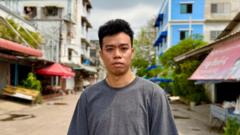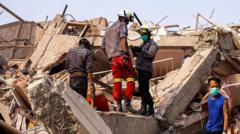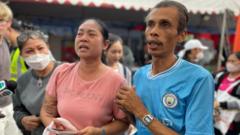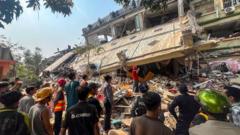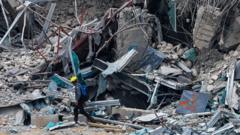The devastating earthquake that struck Myanmar on March 28, has brought to light the serious issue of internet censorship imposed by the military junta, significantly impeding access to timely information about the disaster and hindering aid efforts.
Myanmar's Internet Restrictions Obscure Earthquake Impact

Myanmar's Internet Restrictions Obscure Earthquake Impact
Recent 7.7-magnitude quake highlights challenges of information access amidst military censorship in Myanmar.
Myanmar faced a staggering 7.7-magnitude earthquake that shook the region at approximately 12:50 p.m. local time on Friday, causing considerable damage across central Myanmar and even reaching neighboring Thailand. In the aftermath, a stark contrast emerged between the flood of information coming from Thailand and the silence surrounding the situation in Myanmar. The military government, which seized power in a 2021 coup, has tightly controlled internet access and social media platforms, limiting the flow of crucial information during emergencies.
Since the coup, internet censorship has not only restricted public expression and dissent but has also created significant barriers during disasters. Despite a lack of accessibility to satellite technology in some areas, those in regions afflicted by ongoing conflicts are utilizing alternative services like Starlink to maintain limited online connectivity. Reports from areas historically favored by social media usage show an alarming decline in information availability post-coup.
As experts point out, the military's oppressive policies are contributing to an information vacuum that is prevalent in the aftermath of the earthquake. Joe Freeman, a researcher at Amnesty International, emphasized the disparity, illustrating how the magnitude of media coverage differs starkly between countries affected by the quake. While Thailand buzzed with extensive social media documentation, Myanmar remains shrouded in uncertainty regarding the disaster's actual impact.
The military-controlled media's struggle to maintain an operational online presence further complicates matters, with many official websites going offline immediately following the quake. The struggle illustrates how internet freedom, vital for public safety and response efforts, is continuously undermined by authoritarian rule.
The situation raises pressing questions about the necessity of reliable communication channels in disaster response and the responsibility of international observers and organizations to push for more transparent access to information, especially in nations grappling with authoritarian regimes.
Since the coup, internet censorship has not only restricted public expression and dissent but has also created significant barriers during disasters. Despite a lack of accessibility to satellite technology in some areas, those in regions afflicted by ongoing conflicts are utilizing alternative services like Starlink to maintain limited online connectivity. Reports from areas historically favored by social media usage show an alarming decline in information availability post-coup.
As experts point out, the military's oppressive policies are contributing to an information vacuum that is prevalent in the aftermath of the earthquake. Joe Freeman, a researcher at Amnesty International, emphasized the disparity, illustrating how the magnitude of media coverage differs starkly between countries affected by the quake. While Thailand buzzed with extensive social media documentation, Myanmar remains shrouded in uncertainty regarding the disaster's actual impact.
The military-controlled media's struggle to maintain an operational online presence further complicates matters, with many official websites going offline immediately following the quake. The struggle illustrates how internet freedom, vital for public safety and response efforts, is continuously undermined by authoritarian rule.
The situation raises pressing questions about the necessity of reliable communication channels in disaster response and the responsibility of international observers and organizations to push for more transparent access to information, especially in nations grappling with authoritarian regimes.


